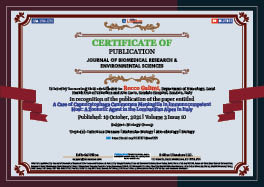Rocco Galimi*
Volume2-Issue10
Dates: Received: 2021-10-09 | Accepted: 2021-10-18 | Published: 2021-10-19
Pages: 902-904
Abstract
The author reports the case of C. canimorsus meningitis consecutive to Capnocytophaga canimorsus infection in a 51-year-old man. Human infection is rare but can lead to devastating outcomes. In patients in whom shortly after a dog or cat bite symptoms of meningitis occurred, C. canimorsus infection should be considered. The purpose of this report is to raise awareness of C. canimorsus among physicians when faced with a patient presenting with meningitis, who has been exposed to dogs or cats. Clinicians should adopt a higher clinical suspicion in the absence of classical risk factors. Although mortality is relatively low, survivors often have neurological sequelae. This case report highlights the importance of thorough history taking to assess risk of underlying C. canimorsus infection, even in immunocompetent hosts.
FullText HTML
FullText PDF
DOI: 10.37871/jbres1329
Certificate of Publication

Copyright
© 2021 Galimi R. Distributed under Creative Commons CC-BY 4.0
How to cite this article
Galimi R. A Case of Capnocytophaga Canimorsus Meningitis in Immunocompetent Host: A Zoonotic Agent in the Lombardian Alpes in Italy. J Biomed Res Environ Sci. 2021 Oct 19; 2(10): 902-904. doi: 10.37871/jbres1329, Article ID: JBRES1329, Available at: https://www.jelsciences.com/articles/jbres1329.pdf
Subject area(s)
References
- Zangenah S, Abbasi N, Andersson AF, Bergman P. Whole genome sequencing identifies a novel species of the genus Capnocytophaga isolated from dog and cat bite wounds in humans. Sci Rep. 2016 Mar 7;6:22919. doi: 10.1038/srep22919. PMID: 26947740; PMCID: PMC4780008.
- Prasil P, Ryskova L, Plisek S, Bostik P. A rare case of purulent meningitis caused by Capnocytophaga canimorsus in the Czech Republic - case report and review of the literature. BMC Infect Dis. 2020 Feb 3;20(1):100. doi: 10.1186/s12879-020-4760-2. PMID: 32013874; PMCID: PMC6998360.
- Hansen M, Crum-Cianflone NF. Capnocytophaga canimorsus Meningitis: Diagnosis Using Polymerase Chain Reaction Testing and Systematic Review of the Literature. Infect Dis Ther. 2019 Mar;8(1):119-136. doi: 10.1007/s40121-019-0233-6. Epub 2019 Jan 31. PMID: 30706413; PMCID: PMC6374236.
- Bobo RA, Newton EJ. A previously undescribed gram-negative bacillus causing septicemia and meningitis. Am J Clin Pathol. 1976 Apr;65(4):564-9. doi: 10.1093/ajcp/65.4.564. PMID: 1266816.
- Zajkowska J, Król M, Falkowski D, Syed N, Kamieńska A. Capnocytophaga canimorsus – an underestimated danger after dog or cat bite – review of literature. Przegl Epidemiol. 2016;70(2):289-295. PMID: 27837588.
- Butler T, Johnston KH, Gutierrez Y, Aikawa M, Cardaman R. Enhancement of experimental bacteremia and endocarditis caused by dysgonic fermenter (DF-2) bacterium after treatment with methylprednisolone and after splenectomy. Infect Immun. 1985 Jan;47(1):294-300. doi: 10.1128/iai.47.1.294-300.1985. PMID: 3965402; PMCID: PMC261511.
- Shin H, Mally M, Meyer S, Fiechter C, Paroz C, Zaehringer U, et al. Resistance of Capnocytophaga canimorsus to killing by human complement and polymorphonuclear leukocytes. Infect Immun. 2009;77:2262-2271. https://bit.ly/3vk55HP
- Wilson JP, Kafetz K, Fink D. Lick of death: Capnocytophaga canimorsus is an important cause of sepsis in the elderly. BMJ Case Rep. 2016 Jun 30;2016:bcr2016215450. doi: 10.1136/bcr-2016-215450. PMID: 27364692; PMCID: PMC4932406.
- McCarthy M, Zumla A. DF-2 infection. BMJ. 1988 Nov 26;297(6660):1355-6. doi: 10.1136/bmj.297.6660.1355. PMID: 3146364; PMCID: PMC1835078.
- Suzuki M, Kimura M, Imaoka K, Yamada A. Prevalence of Capnocytophaga canimorsus and Capnocytophaga cynodegmi in dogs and cats determined by using a newly established species-specific PCR. Vet Microbiol. 2010 Jul 29;144(1-2):172-6. doi: 10.1016/j.vetmic.2010.01.001. Epub 2010 Jan 18. PMID: 20144514.
- Umeda K, Hatakeyama R, Abe T, Takakura K, Wada T, Ogasawara J, Sanada S, Hase A. Distribution of Capnocytophaga canimorsus in dogs and cats with genetic characterization of isolates. Vet Microbiol. 2014 Jun 25;171(1-2):153-9. doi: 10.1016/j.vetmic.2014.03.023. Epub 2014 Mar 30. PMID: 24745627.
- Renzi F, Dol M, Raymackers A, Manfredi P, Cornelis GR. Only a subset of C. canimorsus strains is dangerous for humans. Emerg Microbes Infect. 2015 Aug;4(8):e48. doi: 10.1038/emi.2015.48. Epub 2015 Aug 19. Erratum in: Emerg Microbes Infect. 2016;5:e29. PMID: 26421271; PMCID: PMC4576167.
- Butler T. Capnocytophaga canimorsus: an emerging cause of sepsis, meningitis, and post-splenectomy infection after dog bites. Eur J Clin Microbiol Infect Dis. 2015 Jul;34(7):1271-80. doi: 10.1007/s10096-015-2360-7. Epub 2015 Apr 1. PMID: 25828064.
- Jolivet-Gougeon A, Sixou JL, Tamanai-Shacoori Z, Bonnaure-Mallet M. Antimicrobial treatment of Capnocytophaga infections. Int J Antimicrob Agents. 2007 Apr;29(4):367-73. doi: 10.1016/j.ijantimicag.2006.10.005. Epub 2007 Jan 23. PMID: 17250994.
- Rizk MA, Abourizk N, Gadhiya KP, Hansrivijit P, Goldman JD. A Bite So Bad: Septic Shock Due to Capnocytophaga Canimorsus Following a Dog Bite. Cureus. 2021 Apr 24;13(4):e14668. doi: 10.7759/cureus.14668. PMID: 34055517; PMCID: PMC8144272.
- Popiel KY, Vinh DC. 'Bobo-Newton syndrome': An unwanted gift from man's best friend. Can J Infect Dis Med Microbiol. 2013 Winter;24(4):209-14. doi: 10.1155/2013/930158. PMID: 24489563; PMCID: PMC3905004.
- Gaastra W, Lipman LJ. Capnocytophaga canimorsus. Vet Microbiol. 2010 Jan 27;140(3-4):339-46. doi: 10.1016/j.vetmic.2009.01.040. Epub 2009 Feb 5. PMID: 19268498.
- Piau C, Arvieux C, Bonnaure-Mallet M, Jolivet-Gougeon A. Capnocytophaga spp. involvement in bone infections: a review. Int J Antimicrob Agents. 2013 Jun;41(6):509-15. doi: 10.1016/j.ijantimicag.2013.03.001. Epub 2013 May 1. PMID: 23642766.
- Gottwein J, Zbinden R, Maibach RC, Herren T. Etiologic diagnosis of Capnocytophaga canimorsus meningitis by broad-range PCR. Eur J Clin Microbiol Infect Dis. 2006 Feb;25(2):132-4. doi: 10.1007/s10096-006-0095-1. PMID: 16482426.
- Janda JM, Graves MH, Lindquist D, Probert WS. Diagnosing Capnocytophaga canimorsus infections. Emerg Infect Dis. 2006 Feb;12(2):340-2. doi: 10.3201/eid1202.050783. PMID: 16494769; PMCID: PMC3373098.
- van Samkar A, Brouwer MC, Schultsz C, van der Ende A, van de Beek D. Capnocytophaga canimorsus Meningitis: Three Cases and a Review of the Literature. Zoonoses Public Health. 2016 Sep;63(6):442-8. doi: 10.1111/zph.12248. Epub 2015 Dec 23. PMID: 26693951.